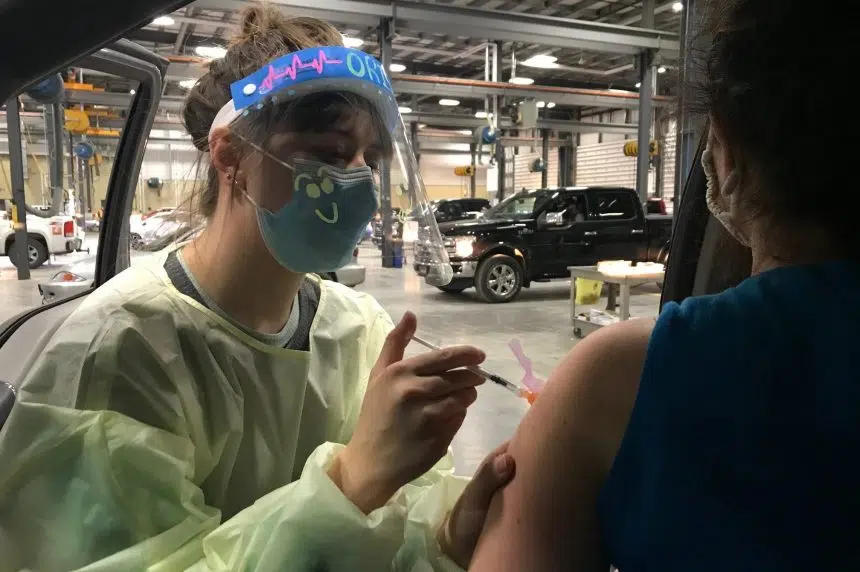The number of people getting their first COVID-19 shot is slowing in Saskatchewan.
Over the past nine days, second COVID doses have outpaced first doses each day, often by many thousands. And where first-dose vaccination rates had been rising by a per cent a day depending on the age bracket, it’s now taking multiple days — sometimes a week — for numbers to tick up for those 40 and older, 30 and older, and all adults.
Saskatchewan may no longer lead other provinces in vaccine uptake, but Health Minister Paul Merriman still says vaccine uptake has been very good here. He doesn’t attribute the slowdown to vaccine hesitancy.
“I just think it’s more summertime. People are not looking at getting vaccinated … People are saying, ‘Oh, we’ll get it done next week or the week after.’ We need you to get in (and) get it done immediately so we can start moving forward in our rollout plan and to reopen Saskatchewan,” Merriman said during a media conference Tuesday.
Merriman isn’t concerned the push into second doses is removing opportunities for people to get their first doses; he said there are still lots of ways for people to get a shot.
The minister explained it was expected for the number of first doses to start slowing down when it got to younger age groups.
“(It’s) just because (younger ages) may not be seeing the immediate impact on themselves on this,” said Merriman. “But what they are failing to see is the impact that this could have on their family (and) on their community — that if they have COVID and if they contract COVID, that it can spread even to people that are fully vaccinated.”
Merriman said there are several strategies in place to reach out to younger demographics.
“We’re engaging the universities and the post-secondaries,” he said. “We’re obviously engaging the schools to make sure that those younger people that are under the age of 40 are getting vaccinated.”
Merriman said health officials are also reaching out to newcomers and new Canadian associations to make sure that demographic is getting information.
While other provinces and areas in the U.S. use incentives like lotteries to get people vaccinated, Merriman said Saskatchewan is not considering any incentives. He repeated the province already has good uptake, and said he hasn’t seen anything to indicate that incentives increase vaccination rates.
Vaccination privilege
Saskatchewan’s top doctor doesn’t see the vaccine campaign as just an opportunity, he sees it as a privilege. Dr. Saqib Shahab said very few countries have such widely available vaccines for anyone over 12 years of age.
“We owe it to ourselves to get vaccinated, protect ourselves, our family and communities as quickly as we can,” said Shahab.
The doctor said Canada has an opportunity to end the worst of the pandemic this summer, so why wouldn’t we?
“For the vast majority of us, we need to address any complacency we may have and get vaccinated as quickly as we can,” Shahab said.
And once Canada is finished the push to get its citizens vaccinated, Shahab said it should help the rest of the world because until everyone is vaccinated, the pandemic won’t end globally.
Breakthrough cases
Merriman and Shahab are pointing to new numbers on breakthrough cases — COVID cases that happen after a person gets a shot — to say the vaccines are working.
In May, 5,296 new COVID cases were reported. Just over eight per cent of those new cases were people who’d had their first shot at least three weeks beforehand. The three-week buffer exists to weed out any cases where the virus may have been contracted before the person got the shot or before protection began.
In hospitalizations, 191 people were admitted to hospital with COVID in May in Saskatchewan, and just under 19 per cent of those had their first dose. Of the 36 who’d been vaccinated, the province said 78 per cent had comorbid medical conditions and 86 per cent were 60 or over.
Thirteen per cent of those hospitalized people who were admitted to intensive care had been vaccinated, and most of them were 70 or over and had comorbidities.
And when it came to deaths recorded in May for people with COVID, seven of the 28 deaths were people who’d had their first dose. The province said the vaccinated people who died were 60 or older and almost all had comorbidities.
Shahab said health officials believe the rates of serious illness from COVID will continue to go down as more people get vaccinated and more people get their second doses.











